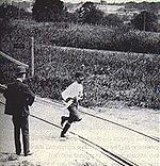
1904 Summer Olympics
Encyclopedia
The 1904 Summer Olympics, officially known as the Games of the III Olympiad, was an international
multi-sport event
which was celebrated in St. Louis, Missouri
, in the United States
from 1 July 1904, to November 23, 1904, at what is now known as Francis Field on the campus of Washington University in St. Louis
.
in St. Louis would not accept another international event in the same time frame.
The exposition organization began to plan for its own sports activities, informing the Chicago OCOG that its own international sports events intended to eclipse the Olympic Games unless they were moved to St. Louis. Pierre de Coubertin
, the founder of the modern Olympic movement, gave in and awarded the games to St. Louis.
in Paris
. Competitions were reduced to a side-show of the World's Fair and were lost in the chaos of other, more popular cultural exhibits. David Francis, the President of the Louisiana Purchase Exposition, declined to invite anybody else to open the Games and, on July 1 did so himself in a scaled-down short and humdrum "ceremony". The Games were so poorly run that, as a result, the Olympic movement almost came to an end.
Officially, the games lasted for four and a half months; in fact, James Edward Sullivan tried to hold an event every day for the duration of the fair. The Olympic caliber events were again mixed with other sporting events, but whereas Paris hardly ever mentioned them, Sullivan called all his sports events "Olympic." The IOC later declared that 94 of these events were Olympic.
The participants totaled 651 athletes - 645 men and 6 women representing 12 countries. However, only 42 events (less than half) actually included athletes who were not from the United States. The actual athletics events that formed the bulk of the recognized Olympic sports were held from Monday, August 29 to Saturday, September 3.
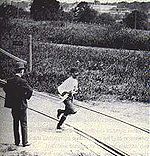 European tension caused by the Russo-Japanese War
European tension caused by the Russo-Japanese War
and the difficulty of getting to St. Louis kept many of the world's top athletes away. In a number of sports, because there were no competitors from other nations, the U.S. national championship was combined with the Olympic championship (and other events such as a local YMCA
swim competition). Boxing
, dumbbells, freestyle wrestling
and the decathlon
made their debuts. The swimming events were held in a temporary pond near Skinker and Wydown Boulevards, where "lifesaving demonstrations" took place of unsinkable lifeboats for ocean liners. The organizers of the World's Fair held "Anthropology Days" on August 12 and 13. Various indigenous men from around the world, who were at the World's Fair as part of the Department of Ethnology exhibits, competed in various events for anthropologists to see how they compared to the white man.
One of the most remarkable athletes was the American gymnast George Eyser
, who won six medals even though his left leg was made of wood.
Frank Kugler
won four medals in freestyle wrestling, weightlifting and tug of war, making him the only competitor to win a medal in three different sports at the same Olympic Games.
Chicago runner James Lightbody won the steeplechase and the 800 m and then set a world record in the 1500 m. Harry Hillman
won both the 200 m and 400 m hurdles and also the flat 400 m. Sprinter Archie Hahn
was champion in the 60 m, 100 m and 200 m. In this last race, he set an Olympic record in 21.6, a record that stood for 28 years. In the discus
, after American Martin Sheridan
had thrown exactly the same distance as his compatriot, Ralph Rose
(39.28 m), the judges gave them both an extra throw to decide the winner. Sheridan won the decider and claimed the gold medal. Ray Ewry
again won all three standing jumps.
The team representing Great Britain was awarded a total of two medals, both won by Irish athletes. The top non-USA athlete was Emil Rausch
of Germany
, who won three swimming events. Zoltan Halmay
of Hungary
and Charles Daniels
of the United States each won two swimming gold medals. Galt Football Club from Canada
won the gold medal in football.
, who actually was just trotting back to the finish line to retrieve his clothes, after dropping out after nine miles. When the officials thought he had won the race, Lorz played along with his practical joke until he was found out shortly after the medal ceremony and was banned for a year by the AAU
for this stunt, later winning the 1905 Boston Marathon
.
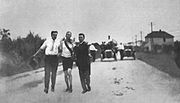 Thomas Hicks (a Briton running for the United States) was the first to cross the finish-line legally, after having received several doses of strychnine sulfate mixed with brandy from his trainers. He was supported by his trainers when he crossed the finish, but is still considered the winner. Hicks had to be carried off the track, and possibly would have died in the stadium, had he not been treated by several doctors. A Cuban postman named Felix Carbajal joined the marathon, arriving at the last minute. He had to run in street clothes that he cut around the legs to make them look like shorts. He stopped off in an orchard en route to have a snack on some apples, which turned out to be rotten. The rotten apples caused him to have to lie down and take a nap. Despite falling ill to apples he finished in fourth place.
Thomas Hicks (a Briton running for the United States) was the first to cross the finish-line legally, after having received several doses of strychnine sulfate mixed with brandy from his trainers. He was supported by his trainers when he crossed the finish, but is still considered the winner. Hicks had to be carried off the track, and possibly would have died in the stadium, had he not been treated by several doctors. A Cuban postman named Felix Carbajal joined the marathon, arriving at the last minute. He had to run in street clothes that he cut around the legs to make them look like shorts. He stopped off in an orchard en route to have a snack on some apples, which turned out to be rotten. The rotten apples caused him to have to lie down and take a nap. Despite falling ill to apples he finished in fourth place.
The marathon included the first two black Africans to compete in the Olympics; two Tswana
tribesmen named Len Tau (real name: Len Taunyane) and Yamasani (real name: Jan Mashiani). But they weren't there to compete in the Olympics, they were actually the sideshow. They had been brought over by the exposition as part of the Boer War
exhibit (both were really students from Orange Free State
in South Africa
, but this fact was not made known to the public). Len Tau finished ninth and Yamasani came in twelfth. This was a disappointment, as many observers were sure Len Tau could have done better if he had not been chased nearly a mile off course by aggressive dogs.
Arriving without correct documents, French man Arthur Coray was not included as part of the French team. He is inconsistently listed as performing in a mixed team in the four mile team race and performing for the US in the marathon.
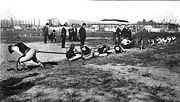 18 disciplines, comprising 16 sports, were part of the Olympic program in 1904.
18 disciplines, comprising 16 sports, were part of the Olympic program in 1904.
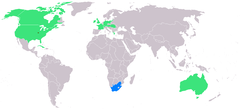
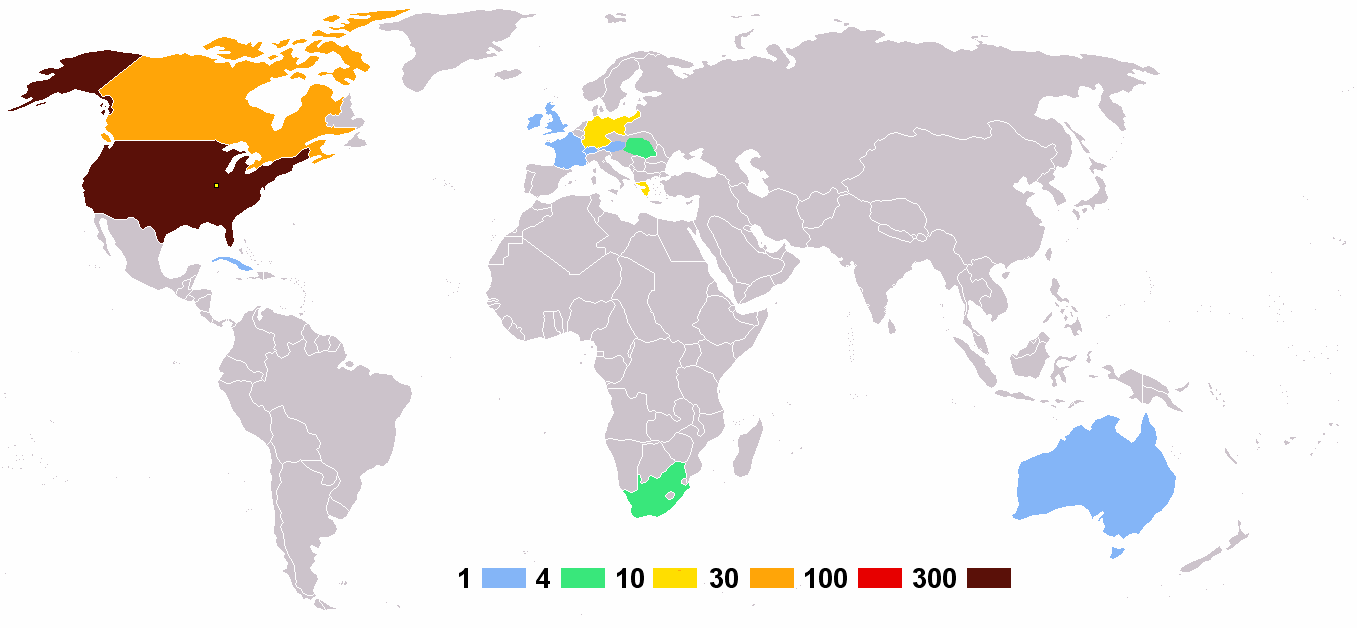 Athletes from only twelve nations competed in St. Louis. Numbers in parentheses indicate the number of known competitors for each nation. Due to the difficulty of getting to St. Louis, and since the Russo-Japanese War caused European tensions, only 55 athletes from outside of North America came to the Olympics.
Athletes from only twelve nations competed in St. Louis. Numbers in parentheses indicate the number of known competitors for each nation. Due to the difficulty of getting to St. Louis, and since the Russo-Japanese War caused European tensions, only 55 athletes from outside of North America came to the Olympics.
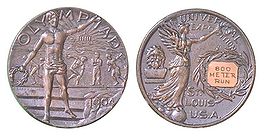
International
----International mostly means something that involves more than one country. The term international as a word means involvement of, interaction between or encompassing more than one nation, or generally beyond national boundaries...
multi-sport event
Multi-sport event
A multi-sport event is an organized sporting event, often held over multiple days, featuring competition in many different sports between organized teams of athletes from nation-states. The first major, modern, multi-sport event of international significance was the modern Olympic Games.Many...
which was celebrated in St. Louis, Missouri
St. Louis, Missouri
St. Louis is an independent city on the eastern border of Missouri, United States. With a population of 319,294, it was the 58th-largest U.S. city at the 2010 U.S. Census. The Greater St...
, in the United States
United States
The United States of America is a federal constitutional republic comprising fifty states and a federal district...
from 1 July 1904, to November 23, 1904, at what is now known as Francis Field on the campus of Washington University in St. Louis
Washington University in St. Louis
Washington University in St. Louis is a private research university located in suburban St. Louis, Missouri. Founded in 1853, and named for George Washington, the university has students and faculty from all fifty U.S. states and more than 110 nations...
.
Background
The city of Chicago, Illinois, had won the original bid to host the 1904 Summer Olympics, but the organizers of the Louisiana Purchase ExpositionLouisiana Purchase Exposition
The Louisiana Purchase Exposition, informally known as the Saint Louis World's Fair, was an international exposition held in St. Louis, Missouri, United States in 1904.- Background :...
in St. Louis would not accept another international event in the same time frame.
The exposition organization began to plan for its own sports activities, informing the Chicago OCOG that its own international sports events intended to eclipse the Olympic Games unless they were moved to St. Louis. Pierre de Coubertin
Pierre de Coubertin
Pierre de Frédy, Baron de Coubertin was a French educationalist and historian, founder of the International Olympic Committee, and is considered the father of the modern Olympic Games...
, the founder of the modern Olympic movement, gave in and awarded the games to St. Louis.
The Games
St. Louis organizers repeated the mistakes made at the 1900 Summer Olympics1900 Summer Olympics
The 1900 Summer Olympics, today officially known as the Games of the II Olympiad, was an international multi-sport event which was celebrated in 1900 in Paris, France. No opening or closing ceremonies were held; competitions began on May 14 and ended on October 28. The Games were held as part of...
in Paris
Paris
Paris is the capital and largest city in France, situated on the river Seine, in northern France, at the heart of the Île-de-France region...
. Competitions were reduced to a side-show of the World's Fair and were lost in the chaos of other, more popular cultural exhibits. David Francis, the President of the Louisiana Purchase Exposition, declined to invite anybody else to open the Games and, on July 1 did so himself in a scaled-down short and humdrum "ceremony". The Games were so poorly run that, as a result, the Olympic movement almost came to an end.
Officially, the games lasted for four and a half months; in fact, James Edward Sullivan tried to hold an event every day for the duration of the fair. The Olympic caliber events were again mixed with other sporting events, but whereas Paris hardly ever mentioned them, Sullivan called all his sports events "Olympic." The IOC later declared that 94 of these events were Olympic.
The participants totaled 651 athletes - 645 men and 6 women representing 12 countries. However, only 42 events (less than half) actually included athletes who were not from the United States. The actual athletics events that formed the bulk of the recognized Olympic sports were held from Monday, August 29 to Saturday, September 3.
Highlights

Russo-Japanese War
The Russo-Japanese War was "the first great war of the 20th century." It grew out of rival imperial ambitions of the Russian Empire and Japanese Empire over Manchuria and Korea...
and the difficulty of getting to St. Louis kept many of the world's top athletes away. In a number of sports, because there were no competitors from other nations, the U.S. national championship was combined with the Olympic championship (and other events such as a local YMCA
YMCA
The Young Men's Christian Association is a worldwide organization of more than 45 million members from 125 national federations affiliated through the World Alliance of YMCAs...
swim competition). Boxing
Boxing
Boxing, also called pugilism, is a combat sport in which two people fight each other using their fists. Boxing is supervised by a referee over a series of between one to three minute intervals called rounds...
, dumbbells, freestyle wrestling
Freestyle wrestling
Freestyle wrestling is a style of amateur wrestling that is practised throughout the world. Along with Greco-Roman, it is one of the two styles of wrestling contested in the Olympic games. It is, along with track and field, one of the oldest organized sports in history...
and the decathlon
Decathlon
The decathlon is a combined event in athletics consisting of ten track and field events. The word decathlon is of Greek origin . Events are held over two consecutive days and the winners are determined by the combined performance in all. Performance is judged on a points system in each event, not...
made their debuts. The swimming events were held in a temporary pond near Skinker and Wydown Boulevards, where "lifesaving demonstrations" took place of unsinkable lifeboats for ocean liners. The organizers of the World's Fair held "Anthropology Days" on August 12 and 13. Various indigenous men from around the world, who were at the World's Fair as part of the Department of Ethnology exhibits, competed in various events for anthropologists to see how they compared to the white man.
One of the most remarkable athletes was the American gymnast George Eyser
George Eyser
George Eyser was a German-American gymnast who competed in the 1904 Summer Olympics, earning six medals in one day, including three gold and two silver medals. Eyser competed with a wooden prosthesis for a left leg, having lost his real leg after being run over by a train...
, who won six medals even though his left leg was made of wood.
Frank Kugler
Frank Kugler
Frank X. Kugler was an American wrestler, weightlifter and tug of war competitor who competed in the 1904 Summer Olympics....
won four medals in freestyle wrestling, weightlifting and tug of war, making him the only competitor to win a medal in three different sports at the same Olympic Games.
Chicago runner James Lightbody won the steeplechase and the 800 m and then set a world record in the 1500 m. Harry Hillman
Harry Hillman
Harry Livingston Hillman Jr. was an American athlete and winner of three gold medals at the 1904 Summer Olympics....
won both the 200 m and 400 m hurdles and also the flat 400 m. Sprinter Archie Hahn
Archie Hahn
Charles Archibald "Archie" Hahn was a German-American athlete, and one of the best sprinters in the early 20th century....
was champion in the 60 m, 100 m and 200 m. In this last race, he set an Olympic record in 21.6, a record that stood for 28 years. In the discus
Discus throw
The discus throw is an event in track and field athletics competition, in which an athlete throws a heavy disc—called a discus—in an attempt to mark a farther distance than his or her competitors. It is an ancient sport, as evidenced by the 5th century BC Myron statue, Discobolus...
, after American Martin Sheridan
Martin Sheridan
Martin John Sheridan was "one of the greatest athletes [the United States] has ever known" according to his obituary in the New York Times. He was born in Bohola, County Mayo, Ireland and died in St. Vincent's Hospital in Manhattan, New York, the day before his 37th birthday, a very early casualty...
had thrown exactly the same distance as his compatriot, Ralph Rose
Ralph Rose
Ralph Waldo Rose was an American track and field athlete.He was born in Healdsburg, California....
(39.28 m), the judges gave them both an extra throw to decide the winner. Sheridan won the decider and claimed the gold medal. Ray Ewry
Ray Ewry
Raymond "Ray" Clarence Ewry was an American track and field athlete who won 8 gold medals at the Olympic Games and 2 gold medals at the "Intercalated Games" . This puts him among the most successful Olympians of all time...
again won all three standing jumps.
The team representing Great Britain was awarded a total of two medals, both won by Irish athletes. The top non-USA athlete was Emil Rausch
Emil Rausch
Emil A. Rausch was a German freestyle swimmer who competed in the 1904 Summer Olympics and 1906 Summer Olympics....
of Germany
Germany
Germany , officially the Federal Republic of Germany , is a federal parliamentary republic in Europe. The country consists of 16 states while the capital and largest city is Berlin. Germany covers an area of 357,021 km2 and has a largely temperate seasonal climate...
, who won three swimming events. Zoltan Halmay
Zoltán Halmay
Zoltán Halmay was a Hungarian Olympic swimmer. He competed in four Olympics , winning the following medals:* 1900: silver , bronze * 1904: gold...
of Hungary
Hungary
Hungary , officially the Republic of Hungary , is a landlocked country in Central Europe. It is situated in the Carpathian Basin and is bordered by Slovakia to the north, Ukraine and Romania to the east, Serbia and Croatia to the south, Slovenia to the southwest and Austria to the west. The...
and Charles Daniels
Charles Daniels (swimmer)
Charles Meldrum "Charlie" Daniels is a former American swimmer and eight-time Olympic medalist. Daniels was an innovator of the front crawl swimming style, inventing the "American crawl".-Career:Daniels began his swimming career with the New York Athletic Club in 1903...
of the United States each won two swimming gold medals. Galt Football Club from Canada
Canada
Canada is a North American country consisting of ten provinces and three territories. Located in the northern part of the continent, it extends from the Atlantic Ocean in the east to the Pacific Ocean in the west, and northward into the Arctic Ocean...
won the gold medal in football.
Marathon
The marathon was the most bizarre event of the Games. It was run in brutally hot weather, over dusty roads, with horses and automobiles clearing the way and creating dust clouds. The first to arrive at the finish line was Frederick LorzFrederick Lorz
Frederick "Fred" Lorz was an American long distance runner who won the 1905 Boston Marathon. Lorz is also known for his "finish" in the marathon at the 1904 Summer Olympics....
, who actually was just trotting back to the finish line to retrieve his clothes, after dropping out after nine miles. When the officials thought he had won the race, Lorz played along with his practical joke until he was found out shortly after the medal ceremony and was banned for a year by the AAU
Amateur Athletic Union
The Amateur Athletic Union is one of the largest non-profit volunteer sports organizations in the United States. A multi-sport organization, the AAU is dedicated exclusively to the promotion and development of amateur sports and physical fitness programs.-History:The AAU was founded in 1888 to...
for this stunt, later winning the 1905 Boston Marathon
Boston Marathon
The Boston Marathon is an annual marathon hosted by the U.S. city of Boston, Massachusetts, on Patriots' Day, the third Monday of April. Begun in 1897 and inspired by the success of the first modern-day marathon competition in the 1896 Summer Olympics, the Boston Marathon is the world's oldest...
.

The marathon included the first two black Africans to compete in the Olympics; two Tswana
Tswana language
Tswana or Setswana is a language spoken in Southern Africa by about 4.5 million people. It is a Bantu language belonging to the Niger–Congo language family within the Sotho languages branch of Zone S , and is closely related to the Northern- and Southern Sotho languages, as well as the Kgalagadi...
tribesmen named Len Tau (real name: Len Taunyane) and Yamasani (real name: Jan Mashiani). But they weren't there to compete in the Olympics, they were actually the sideshow. They had been brought over by the exposition as part of the Boer War
Second Boer War
The Second Boer War was fought from 11 October 1899 until 31 May 1902 between the British Empire and the Afrikaans-speaking Dutch settlers of two independent Boer republics, the South African Republic and the Orange Free State...
exhibit (both were really students from Orange Free State
Orange Free State
The Orange Free State was an independent Boer republic in southern Africa during the second half of the 19th century, and later a British colony and a province of the Union of South Africa. It is the historical precursor to the present-day Free State province...
in South Africa
South Africa
The Republic of South Africa is a country in southern Africa. Located at the southern tip of Africa, it is divided into nine provinces, with of coastline on the Atlantic and Indian oceans...
, but this fact was not made known to the public). Len Tau finished ninth and Yamasani came in twelfth. This was a disappointment, as many observers were sure Len Tau could have done better if he had not been chased nearly a mile off course by aggressive dogs.
Arriving without correct documents, French man Arthur Coray was not included as part of the French team. He is inconsistently listed as performing in a mixed team in the four mile team race and performing for the US in the marathon.
Sports

|
Gymnastics at the 1904 Summer Olympics At the 1904 Summer Olympics, eleven gymnastics events were contested, all for men only.The 1904 Games had a confusing program of events spread out over several months, and the gymnastics competition was no different... Lacrosse at the 1904 Summer Olympics -Shamrock Lacrosse Team:*Eli Blanchard*William Brennaugh*George Bretz*William Burns*George Cattanach*George Cloutier*Sandy Cowan*Jack Flett*Benjamin Jamieson*Stuart Laidlaw*Hilliard Lyle*Lawrence Pentland-St. Louis Amateur Athletic Association:... Roque at the 1904 Summer Olympics At the 1904 Summer Olympics in St. Louis, a roque tournament was contested. The United States was the only nation to have athletes participate... Rowing at the 1904 Summer Olympics At the 1904 Summer Olympics, five rowing events were contested. The Olympics were held in St. Louis, United States, and all of the rowing competitors, save the Canadian men's eight, were from the United States. All competitions were held on Saturday, July 30, 1904.... Tennis at the 1904 Summer Olympics Two events in tennis were contested at the 1904 Summer Olympics in St. Louis, United States. The competitions were held from Monday, August 29, 1904 to Monday, September 5, 1904.... Tug of war at the 1904 Summer Olympics At the 1904 Summer Olympics, a tug of war tournament was contested. Six teams from three nations competing, with a total of 30 athletes involved. The four American teams took the top four places.-Results:... Weightlifting at the 1904 Summer Olympics At the 1904 Summer Olympics in St. Louis, two weightlifting events were contested, both for men only.-Medal summary:-Medal table:-References:*... Wrestling at the 1904 Summer Olympics At the 1904 Summer Olympics, seven wrestling events were contested, all in the freestyle discipline for men. All wrestlers who competed in the 1904 Games were from the United States. It was the first time freestyle wrestling was featured, as the first Olympic wrestling contests had been in the... |
- BasketballBasketball at the 1904 Summer OlympicsBasketball appeared at the 1904 Summer Olympics for the first time, as a demonstration sport. There were four different events in Saint Louis for basketball competition.-Amateur championships:*Buffalo German YMCA def. Missouri AC, 97-8...
was featured as a demonstration sportDemonstration sportA demonstration sport is a sport which is played to promote itself, most commonly during the Olympic Games, but also at other sporting events.Demonstration sports were officially introduced in 1912 Summer Olympics, when Sweden decided to include glima, traditional Icelandic wrestling, in the...
. - Baseball was featured as a demonstration sportDemonstration sportA demonstration sport is a sport which is played to promote itself, most commonly during the Olympic Games, but also at other sporting events.Demonstration sports were officially introduced in 1912 Summer Olympics, when Sweden decided to include glima, traditional Icelandic wrestling, in the...
.
Venues
- Creve Coeur LakeCreve Coeur Lake Memorial ParkCreve Coeur Lake Memorial Park is a St. Louis County park located in Maryland Heights, Missouri, United States. The park is the largest in the St. Louis County Parks system and includes Creve Coeur Lake, an oxbow lake which is the largest natural lake in Missouri...
- RowingRowing at the 1904 Summer OlympicsAt the 1904 Summer Olympics, five rowing events were contested. The Olympics were held in St. Louis, United States, and all of the rowing competitors, save the Canadian men's eight, were from the United States. All competitions were held on Saturday, July 30, 1904.... - Francis Field - ArcheryArchery at the 1904 Summer OlympicsAt the 1904 Summer Olympics in Saint Louis, six archery events were contested, of which three were men's and three were women's competitions. Only American archers competed. 23 men and 6 women constituted the entire field....
, AthleticsAthletics at the 1904 Summer OlympicsAt the 1904 Summer Olympics, twenty-five athletics events were contested, all for men only.Multi-event competitions, the decathlon and triathlon, were introduced for the first time. The short steeplechase was lengthened slightly, from 2500 to 2590 metres, while the long steeplechase was...
, CyclingCycling at the 1904 Summer OlympicsAt the 1904 Summer Olympics, seven cycling events were contested. They were all track events for men only. Only cyclists from the United States competed in the 1904 cycling competition....
, FootballFootball at the 1904 Summer OlympicsAt the 1904 Summer Olympics, a football event was contested. Only three club teams competed. No medals were awarded at the time, but the IOC subsequently awarded gold, silver, and bronze medals and upgrade the status of the contests to an official event....
, GymnasticsGymnastics at the 1904 Summer OlympicsAt the 1904 Summer Olympics, eleven gymnastics events were contested, all for men only.The 1904 Games had a confusing program of events spread out over several months, and the gymnastics competition was no different...
, LacrosseLacrosse at the 1904 Summer Olympics-Shamrock Lacrosse Team:*Eli Blanchard*William Brennaugh*George Bretz*William Burns*George Cattanach*George Cloutier*Sandy Cowan*Jack Flett*Benjamin Jamieson*Stuart Laidlaw*Hilliard Lyle*Lawrence Pentland-St. Louis Amateur Athletic Association:...
, RoqueRoque at the 1904 Summer OlympicsAt the 1904 Summer Olympics in St. Louis, a roque tournament was contested. The United States was the only nation to have athletes participate...
, TennisTennis at the 1904 Summer OlympicsTwo events in tennis were contested at the 1904 Summer Olympics in St. Louis, United States. The competitions were held from Monday, August 29, 1904 to Monday, September 5, 1904....
, Tug of warTug of war at the 1904 Summer OlympicsAt the 1904 Summer Olympics, a tug of war tournament was contested. Six teams from three nations competing, with a total of 30 athletes involved. The four American teams took the top four places.-Results:...
, WeightliftingWeightlifting at the 1904 Summer OlympicsAt the 1904 Summer Olympics in St. Louis, two weightlifting events were contested, both for men only.-Medal summary:-Medal table:-References:*...
, and WrestlingWrestling at the 1904 Summer OlympicsAt the 1904 Summer Olympics, seven wrestling events were contested, all in the freestyle discipline for men. All wrestlers who competed in the 1904 Games were from the United States. It was the first time freestyle wrestling was featured, as the first Olympic wrestling contests had been in the... - Francis GymnasiumFrancis Gymnasium (St. Louis)Francis Gymnasium is a building at Washington University in St. Louis, currently used by the university's athletics department. It is located in St. Louis County, Missouri, on the far western edge of the university's Danforth Campus. Constructed in 1903, it was built in time for the 1904 World's...
- BoxingBoxing at the 1904 Summer OlympicsAt the 1904 Summer Olympics, seven boxing events were contested. Only American boxers competed. The competitions were held on Wednesday, September 21, 1904 and on Thursday, September 22, 1904. Contestants in lighter weight classes could also compete in heavier classes...
, FencingFencing at the 1904 Summer OlympicsAt the 1904 Summer Olympics, five fencing events were contested, all for men only. The third edition of the Olympic fencing program included a team event for the first time, as well as the only Olympic singlestick competition. Events for fencing professionals were eliminated... - Forest Park - DivingDiving at the 1904 Summer OlympicsAt the 1904 Summer Olympics, in St. Louis, diving debuted as an official two-event Olympic sport, exclusive for men. The competitions were held on Monday, September 5, 1904 and on Wednesday, September 6, 1904.-Medal summary:-Medal table:...
, SwimmingSwimming at the 1904 Summer OlympicsAt the 1904 Summer Olympics, nine swimming events were contested, all for men. The 1904 swimming competition was the only time in Olympic history that racing distances were measured in yards. The competition was held September 4–6, 1904. There was a total of 32 participants from 5 countries...
, and Water poloWater polo at the 1904 Summer OlympicsAt the 1904 Summer Olympics, a water polo tournament was contested. Only American contestants participated; three teams of 7 players each entered....
. - Glen Echo Country ClubGlen Echo Country ClubGlen Echo County Club, located in Normandy, Missouri, a St. Louis suburb, is a private golf club that was founded by George McGrew and his son-in-law, Albert Bond Lambert. Completed in 1901, it was the first 18-hole golf course in St. Louis and the first golf course constructed west of the...
- GolfGolf at the 1904 Summer OlympicsAt the 1904 Summer Olympics, two golf events were contested – men's individual and team tournaments. The competitions were held from September 17, 1904 to September 24, 1904....
Participating nations


Disputed
Some sources also list athletes from the following nations as having competed at these Games. http://www.sports-reference.com/olympics/countries/ITA/summer/1904/http://www.sports-reference.com/olympics/countries/NOR/summer/1904/ http://www.sports-reference.com/olympics/countries/NFL/summer/1904/Medal count

| 1 | (host nation) | 78 | 82 | 79 | 239 |
| 2 | 4 | 4 | 5 | 13 | |
| 3 | 4 | 2 | 3 | 9 | |
| 4 | 4 | 1 | 1 | 6 | |
| 5 | 2 | 1 | 1 | 4 | |
| 6 | 1 | 1 | 0 | 2 | |
| 1 | 1 | 0 | 2 | ||
| 8 | 1 | 0 | 1 | 2 | |
| 1 | 0 | 1 | 2 | ||
| 9 | 0 | * | 0 | * | |
| 10 | 0 | 0 | 1 | 1 |

